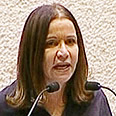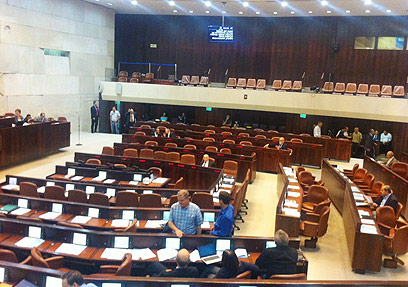

The Knesset plenum on Monday approved a series of tax hikes meant to stabilize the Israeli economy.
The vote on the bill, dubbed "The bill to reduce the deficit and handle the global economic crisis," was carried 28:16; 76 Knesset member were absent from the vote.
One of the measures approves was the Finance Committee's recommendation to raise VAT by 1% to 17%, starting in September.
Just moments before the session, the government caved in to pressure and agreed to cancel some of the income tax hikes but did not increase corporate income tax.
The government accepted Knesset Finance Committee Chairman Moshe Gafni (United Torah Judaism) proposal that the government abandon its plan to raise the income tax for people earning over NIS 8,870 (about $2,200) by 1%, and instead increase the income tax collected from employees earning more than NIS 14,000 (some $3,500) by the same amount.
Speaking before the vote, Finance Minister Yuval Steinitz, who mentioned Sunday's terror attack on the Egyptian border said: "Like the security situation, in the economic situation we have no one to put our trust in but ourselves – and God."
According to Steinitz, the original framework of the plan is being maintained "We are presenting the Knesset with a package, with several internal changes, of NIS 14 billion ($3.52 billion) to cover the deficit."

Empty plenum (Photo: Moran Azulay)
He went on to explain: "From both a security and an economic perspective we don't have NATO or the EU and the Euro bloc – unlike Portugal and Ireland. And unlike Spain, Greece and Italy – we don't have a safety net of hundreds of billions of dollars.
Steinitz addressed the last minute income tax compromise, which would now only be collected from anyone with a salary of over NIS 14,000 ($3,500) and said: "The low income and lower middle class – will not experience any tax changes.
"These measures make it easier for the lower middle class and low income population in exchange for a slight increase in the burden placed on the upper class and high income population which is why they are reasonable and even appropriate."
Steinitz noted that "the decision today serves Israel's economy and protects the citizens of Israel. It is a model of worthy economic governance."
Meanwhile, Labor Party Chief Shelly Yachimovich criticized the economic measures and questioned the tax hike plan. In a separate statement she praised the Labor Party committee and the Finance Committee Chairman for the "income tax compromise" but added "yet those whose salary is over NIS 42,000 won't pay even one extra shekel.
"Netanyahu knows, with the greatest cynicism, that 2% tax for those whose income is over NIS 67,000 a month is hard and that collecting is complicated. That in fact while the middle class pays here and now because of both the VAT increase and the income tax increase, not a hair on the heads of those who earn massive salaries will be touched.















